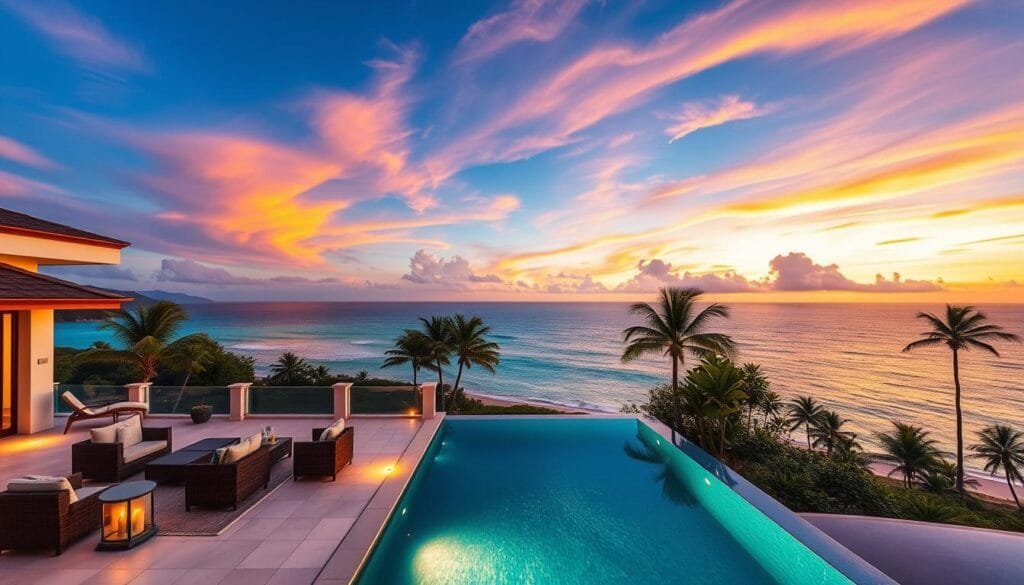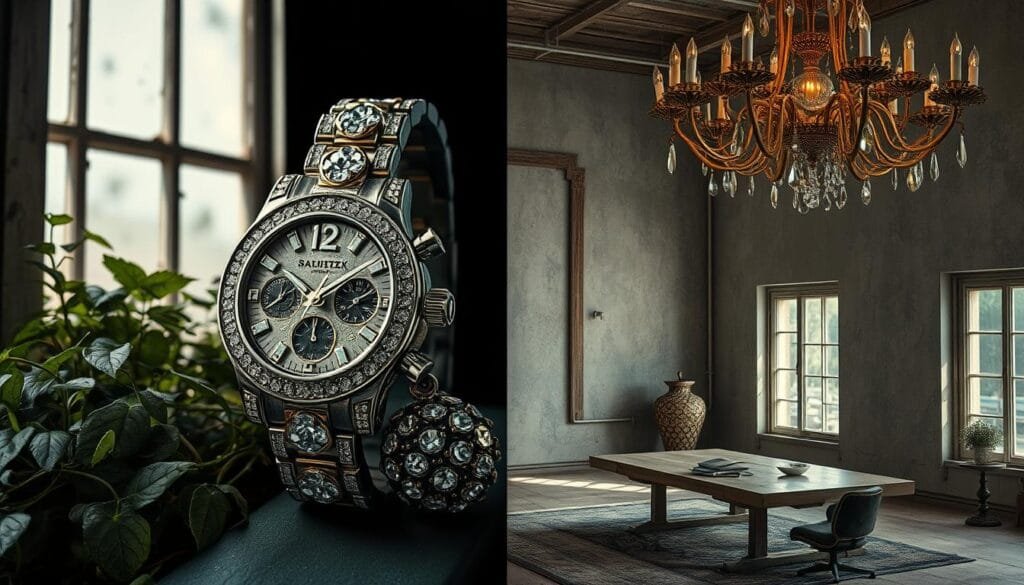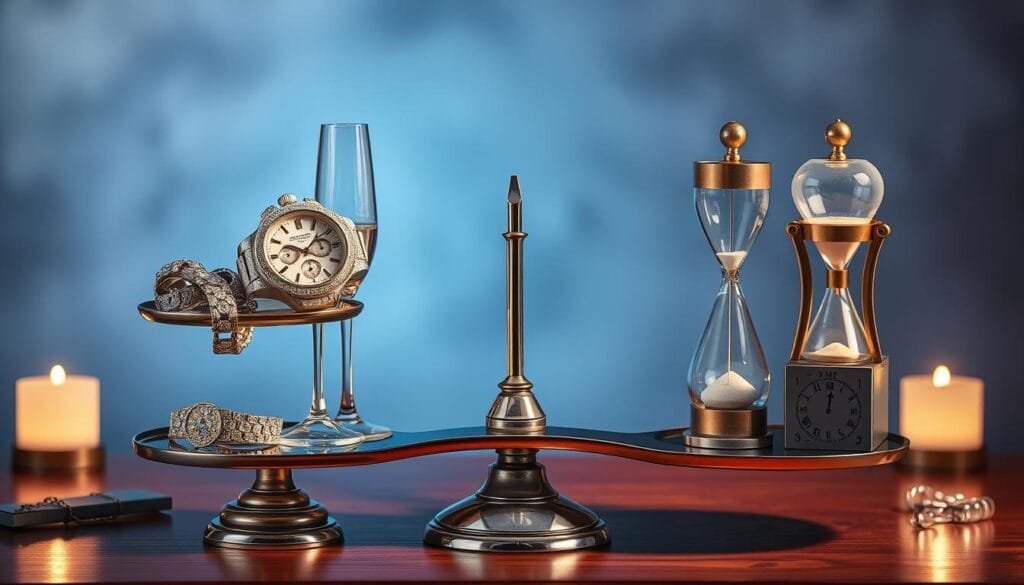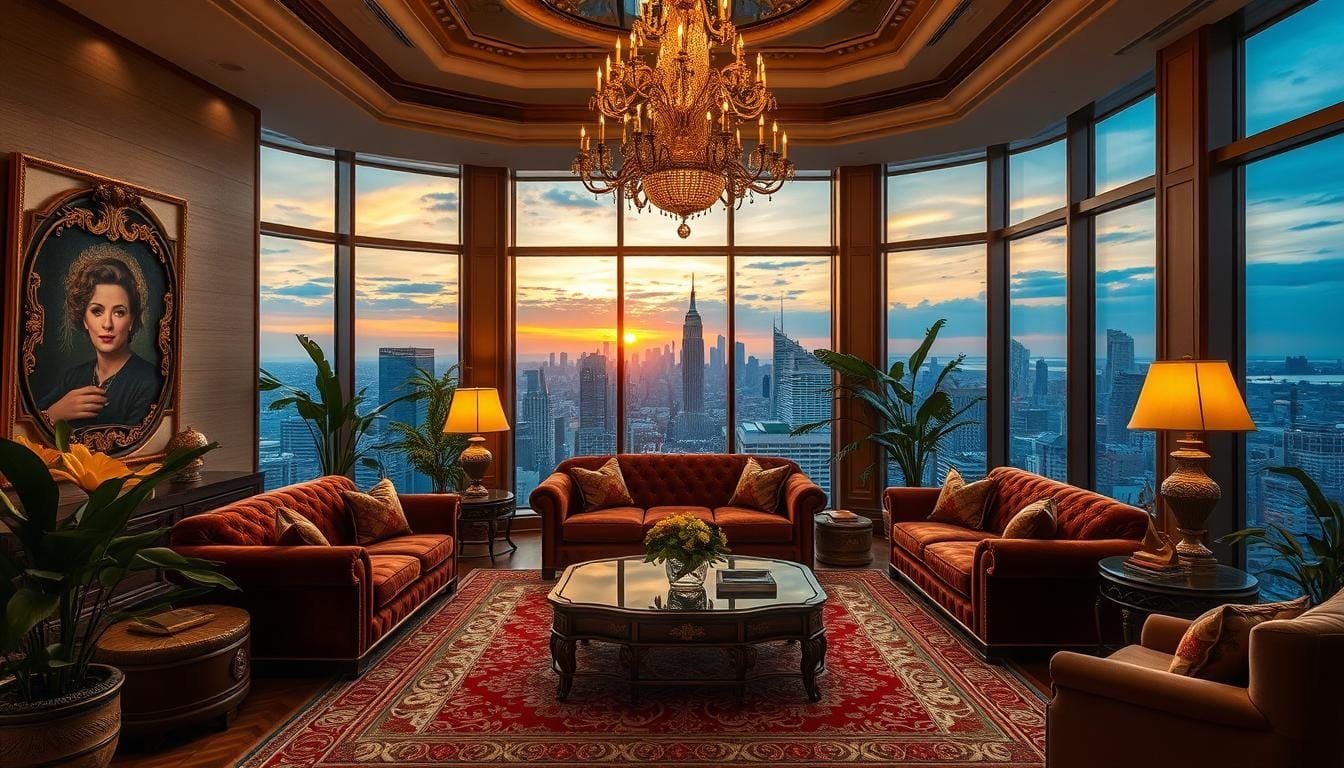Do you ever wonder about luxury living? Is it truly fulfilling or just an illusion? We often ask if there’s real value in luxury or if it’s all about superficial wants.
Luxury brands like Louis Vuitton and Dior are changing. They’re cutting costs and adopting fast fashion trends. This has led to lower quality. It makes us question what luxury really means today.
Luxury can sometimes focus on minor issues, viewed as “first world problems”. Some people might wear peace sign earrings or decorate their halls with activist posters. Meanwhile, others think about how these actions affect poorer regions.
These days, luxury buyers like brands that are sustainable and ethical. Such brands use quality materials and care about how they make their products. This shift tells us that real value comes from the story and values behind what we buy.
Exploring luxury makes us think about how to balance enjoyment with living a life that’s truly meaningful. It helps us decide if luxury is worth it, beyond just the sparkle.
Key Takeaways
- Luxury living often raises questions about the true value and fulfillment it provides.
- The luxury market is shifting towards faster production at the cost of quality and long-term brand value.
- Economic pressures and “first world problems” can cloud our perception of luxury.
- Sustainable brands prioritize ethical practices, emphasizing quality over quantity.
- Finding value in luxury means balancing indulgence with meaningful and principled living.
Understanding the Concept of Luxury
Luxury is more than just rich materials or money. It has changed over time, adapting to different cultures and societies. Luxury includes not just fancy items like yachts or costly jewelry, but also things you can’t touch.
Defining Luxury: Beyond Material Possessions
In the past, people saw luxury as owning a lot of expensive stuff. But now, luxury also means special experiences. Millennials and Gen Z mix high-end items with meaningful moments. A survey found that rich Millennials choose fancy goods for their status and brand power.
The Historical Context of Luxury Lifestyles
Luxury’s history shows how its meaning has evolved. The elite used to show off their wealth with big homes, fancy clothes, and exclusive parties. By 2021 and 2022, luxury brands like LVMH saw huge growth, making more than half a trillion dollars.
Now, Millennials and Gen Z are changing the luxury world. They make up 41 percent of luxury buyers online and might be 80 percent of luxury shoppers by 2030. This change shows luxury isn’t just for the wealthy anymore. It’s becoming a part of more people’s lives.
Why People Aspire to a Luxury Lifestyle
Many people dream of a luxurious life. It stems from deep human psychology. The charm lies in the pursuit of status and being recognized. It’s not just about fancy items. It’s about what these items mean in society.
Psychological Drivers: Status and Recognition
One big reason people want luxury is for the status. Items like expensive watches or designer clothes signal social success. They show wealth and an elevated social status.
For example, in the luxury watch world, high prices mean a certain lifestyle. It suggests that only some can afford these, showing their high status.
Owning luxury items has a big psychological effect too. Small luxuries make us feel good and can boost mood. They help us be more creative and productive by lowering stress.
The Social Influence of Media and Culture
The media’s role in promoting luxury is huge. Ads and digital media show us what luxury looks like. They tell us buying certain things can make us look better, which is often misleading.

Luxury marketing often focuses on the lifestyle a brand sells, not the item’s quality. This approach targets our need to belong and be recognized. It makes us think that having such items will improve our social status.
In the end, media and culture shape how we see luxury. They play on our desires for recognition and fitting in. The message is clear: achieve the luxury lifestyle, get the status.
Is Luxury Lifestyle Useless?
The debate on luxury lifestyle’s value is complex. Critics and proponents view it differently, leading to many discussions. Some say it offers a fulfilling life. Others think it hides deeper problems.

Take fast fashion as an example. It’s part of luxury living but hurts the planet by adding 10% to global carbon emissions. Americans also spend a lot on home upgrades, about $7,560 a year, because of luxury trends. But does it make them happier?
Luxury cars show a similar issue. They’re more about status than need and bring high costs. This raises questions if they’re really worth it.
Luxury affects electronics and entertainment too. People spend a lot on gadgets and services, watching TV for over 3 hours a day. This could lead to less productivity. So, are these luxuries valuable?
Luxury vacations are under the microscope too. A basic Disney World trip for four costs about $6,865. Fancy versions cost much more. It makes one think about how we use our money.
Is there real value in expensive gym memberships or fancy home decor? Buying costly jewelry and keeping up with trends gives status but at a high cost. Luxury goods spending went up by 4%, but is it worth it?
In the end, looking at luxury living reveals downsides. While it offers comfort and status, it can harm our finances, the planet, and our health. Finding a balance between wants and needs is key.
Exploring Alternatives to Luxury Living
As we explore modern life, many of us look for alternatives to luxury living. This search leads to ideas that focus on living with less but in a more meaningful way. Let’s explore these rewarding lifestyles together.
The Minimalist Approach
More people are choosing minimalist living to escape the clutter of luxury. By focusing on what’s essential, we avoid the burden of having too much. This lifestyle values experiences and relationships over things, making us rethink what abundance really means.
Research shows that people enjoy their belongings more when they value their use over their quantity. Minimalist living encourages us to find satisfaction in the authenticity and usefulness of what we own.
Living an Abundant Life Through Simple Pleasures
Enjoying simple pleasures is key to redefining a rich life. It could be enjoying nature, spending time with family, or engaging in hobbies. These moments bring us deeper joy than any luxury item could.
The happiness from these activities shows a shift away from high-end consumption. It leads towards a life of true happiness and health.
| Luxury Lifestyle | Minimalist Living |
|---|---|
| Focus on material possessions | Focus on essential items |
| High costs and maintenance | Lower costs and upkeep |
| Associated with societal status | Associated with personal contentment |
| Stress and anxiety from upkeep | Peace and simplicity |
This table shows the contrast between minimalist living and luxury lifestyles. Choosing minimalist living and simple pleasures leads to a richer, more satisfying life. It’s not only more affordable but also deeply rewarding.
Luxury vs. Time: Finding a Balance
It’s important to balance luxury and time management for a valuable life. This balance enhances our daily life and helps us use our time wisely.

Tim Denning’s Perspective on Luxury and Free Time
Tim Denning believes in valuing time more than luxury. He says luxury should enhance life, not take it over. Enjoying luxury sometimes makes us feel good, increasing happiness and motivation.
“Luxury is like a drug,” Denning notes. “Indulging in it occasionally can provide a balanced human experience.”
Denning suggests balancing luxury and time. Buying luxuries on credit is common, but he prefers experiences over things. Experiences can boost happiness without adding debt.
Maximizing Value in Everyday Life
We should enjoy simple things and use our time smartly. Doing things that engage our senses can make lasting memories. Enjoying small luxuries can make us feel proud and relaxed.
- Mindful Spending: Spend on luxury that boosts happiness and brain function, not just for short pleasure.
- Value-Based Choices: Choose practical luxuries. They should offer long-term happiness and make us feel special.
- Time Investments: Choose activities that are good for our emotions and health, making a lasting positive impact.
| Aspect | Luxury | Time |
|---|---|---|
| Short-term Effectiveness | High through serotonin and dopamine release | Medium depending on activity |
| Long-term Benefit | Moderate with occasional indulgence | High if time is invested wisely |
| Emotional Balance | Improves with moderate consumption | Stabilizes with proper management |
Using these strategies, we can balance luxury with time management. This way, we maximize life value.
The Psychological and Emotional Costs of Luxury
Living luxuriously might seem appealing, but it comes with hidden downsides. The emotional toll is often overlooked due to the glitter and glamour. The push for a high-end life can lead to more stress and anxiety because of societal pressures.
Stress and Anxiety Linked to High-End Living
Wanting a luxury lifestyle can cause a lot of stress. Studies show a big 61% of those who buy luxury goods feel anxious about their status. This chase for prestige leads to ongoing stress to get more and keep up appearances, shown by 42% feeling the need to match wealthy social groups.
About 49% face conflict within themselves between their values and buying habits. An in-depth look at this can be found in this article. It talks about how luxury shopping affects our mental health and self-respect.
Human Connection and Well-being
Luxury items symbolize success, but their effect is complicated. Interestingly, 70% cherish the history behind luxury brands. This shows an emotional connection beyond just material wants. Yet, this does not shield them from bad effects.
67% are driven by their feelings when they shop for luxury, and nearly 64% show narcissistic traits. This constant need for approval can take away from real human connections and true joy. It’s important to find a balance between luxury and well-being for lasting happiness.
Even though luxury items are high-status symbols, it’s key to think about what truly makes us feel good emotionally. Keeping up real friendships and staying true to ourselves are better for a satisfying life than always chasing luxury.
| Statistic | Insight |
|---|---|
| 83% | Associate luxury with high social status and success |
| 67% | Emotionally driven in their luxury purchases |
| 61% | Experience status-seeking anxiety |
| 42% | Feel pressure to fit into affluent social circles |
| 49% | Struggle with cognitive dissonance |
Wendell Berry’s Take on Luxury and Values
Wendell Berry has unique views on luxury and how we live. He warns us against living only for consumption. Berry, a thinker who loves nature, tells us to be careful with our consumption. He says a good economy uses resources that can renew themselves. It values honesty and being careful with what we have, not just using everything up.
The Importance of Practicing What We Preach
Wendell Berry talks about the importance of living out our values. He believes in a sustainable way of living. We should give back to nature as much as we take. This ensures nature stays healthy. Berry pushes us to think about our actions. He says we should make sure they match our stated values. This, he believes, makes life more meaningful.
Avoiding a Passively Consumptive Lifestyle
Berry warns us about the dangers of just consuming mindlessly. He thinks our economy focuses too much on buying things. This, he says, can harm important qualities like being generous and creative. Berry suggests we choose an economy that cares for lasting resources rather than short-term benefits. He believes in living a life where needs come before wants. According to him, the best way to a sustainable future is by making responsible choices every day.
Conclusion
As we wrap up our discussion on luxury lifestyles, it’s important to think about what we’ve learned. It’s key to look beyond material wealth for a meaningful life. Living with purpose, connections, and spiritual growth matters more than just owning expensive things.
Luxury has deep roots in our desire for status and the images we see in media. But chasing after these can lead to stress and worry. Wendell Berry tells us to live actively, not just consume. When we live by our values, life is more rewarding and easier.
Considering simpler ways of life, like minimalism, can bring us joy and balance. Tim Denning and others believe that time and experiences are worth more than things. By looking at luxury in new ways, we find that true happiness comes from purpose and real connections, not just fancy stuff.
FAQ
Is a Luxury Lifestyle Useless? Finding Value
Many wonder about the real value of a luxury lifestyle. It can bring comfort and status. But, it’s important to ask if it truly enriches our lives beyond just being a show of wealth. This part looks at how luxury also means meaningful experiences, not just expensive things.
Defining Luxury: Beyond Material Possessions
Luxury isn’t just about pricey items. It also means unique experiences and the joy of exclusivity. Today, luxury includes not just things you can own but also special moments and a feeling of freedom that make life rich.
The Historical Context of Luxury Lifestyles
Luxury’s meaning has evolved. In the past, it was all about showing off wealth among the elite. Now, luxury means personal joy, self-expression, and unique experiences that more people can enjoy, not just the rich.
Psychological Drivers: Status and Recognition
People often seek luxury for status and to be recognized. Owning luxury items can show off success and bring admiration. This section explores why we’re drawn to luxury for these psychological reasons.
The Social Influence of Media and Culture
Media and culture greatly shape our views on luxury. Through ads and social media, luxury is often seen as key to happiness. This affects our goals and what we buy.
Is Luxury Lifestyle Useless?
There’s much debate on the value of a luxury lifestyle. It offers pleasure and comfort, sure. Yet, we should think about if the benefits justify the costs. Perhaps simpler living might bring more joy and wellbeing.
The Minimalist Approach
Minimalism presents an alternative to fancy living. It values living simply and with purpose, showing we can be happy with less. This approach helps us focus on what’s truly important.
Living an Abundant Life Through Simple Pleasures
Abundance truly comes from simple joys like enjoying nature and spending time with loved ones. Valuing these things can make life richer and more satisfying without expensive items.
Tim Denning’s Perspective on Luxury and Free Time
Tim Denning believes we should value time more than material things. Choosing experiences over owning stuff can make us happier. He urges us to rethink how we use our resources.
Maximizing Value in Everyday Life
It’s important to find value in daily life without just focusing on luxury. Making thoughtful choices can improve our happiness and fulfillment. This section gives tips on living well by choosing wisely.
Stress and Anxiety Linked to High-End Living
A life of luxury can mean more stress and worry. The need to maintain an image can harm relationships and wellbeing. It’s worth considering what really makes us happy.
Human Connection and Well-being
Sometimes, luxury can impact our relationships and happiness negatively. This part talks about how choosing meaningful connections over items can lead to a happier life.
The Importance of Practicing What We Preach
Wendell Berry talks about living true to our values. It means making choices that reflect our beliefs, rather than just consuming. It’s about living intentionally, in line with what we stand for.
Avoiding a Passively Consumptive Lifestyle
Living without thought for our consumption can leave us unhappy. This section encourages us to think about our choices and to live by our true values.
